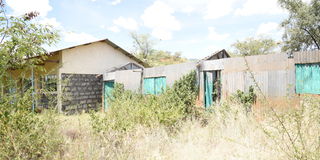Fate of 3,000 learners in banditry-prone areas unknown as schools reopen

Kapindasum Primary School in Baringo South which has been overgrown with shrubs following prolonged closure due to insecurity.
As millions of learners countrywide report back to school for their second term, the fate of more than 3,000 others in more than eight primary and secondary schools in volatile areas of Baringo South sub-county is unknown following violence flare-ups.
Incessant bandit attacks and stock theft has led to the closure of dozens of schools and other social amenities since March after thousands of locals fled to safer areas for fear of more violence.
Among the affected are Kapindasum, Arabal, Sinoni, Kasiela, Kapkechir and Chebinyiny primary schools, Lamaiywe ECDE centre, and Embosos Secondary School.
In Baringo County, more than 36 people have been shot dead since the beginning of the year and scores of others are nursing serious gunshot injuries.
Security first
Parents in border villages have vowed that they will not return to the troubled areas unless the government beefs up security and flushes out armed bandits.
Some of the villages that have become inhabitable since the beginning of the year after bandits struck are Kitorongon, Menmeno, Seretion, Chepng'anian, Kapsikwon, Lomulel, Korkoron, Kapkechir, Tuiyotich, Ramacha, Katilomwo, Tandar, Kapindasum and Soke.
Locals and their school-age children have fled to safer villages in Kabel, Kirim, Kamailel and Waseges, dozens of kilometers away, until normality returns.
Paul Kipyemat, a parent from Arabal village, regretted that they have been out of their homes since March, a situation that has also kept some learners out of school.
School dropouts
“While some parents have enrolled their children in schools where they have moved to, some children whose parents fled to remote villages have been out of school since March, raising fears that they could drop out completely if urgent measures are not put in place to relocate them to their homes,” Mr Kipyemat said.
“But we are demanding the government to assure us of our safety first. We do not want to put our lives in danger, because several people have been shot dead by bandits in the area.”
Richard Chepchomei, a parent from the restive Chemoe village in Baringo North, said most of the learners may drop out of school after relocating to remote villages since March.
To retain the learners in school, he insisted that the government must beef up security in the troubled border areas.
But relative calm is slowly returning to the border areas, thanks to a security operation and a dusk-to-dawn curfew imposed by the state a month ago in Baringo, West Pokot and Elgeyo Marakwet counties as part of a crackdown on armed criminals.
The security operation to flush out criminals and seize illegal guns was launched by Interior CS Fred Matiang’i and dozens of arms have been seized from civilians and some suspects arrested.
Displaced locals slowly return
With few incidents now, residents in some of the affected areas are beginning to return to their normal activities, a sharp contrast to the situation a month ago, when gun-toting criminals had wreaked havoc in the troubled areas, killing people, including security officers.
Baringo County Commissioner Abdirisack Jaldesa said that to help displaced locals return to their homes, they were planning to distribute relief food to them, and to the affected schools so that learning could resume.
“Uneasy calm is slowly returning to the porous areas and we are appealing to locals who had been displaced from their homes to go back and resume their normal activities. As we speak, we have flushed out armed criminals who had invaded the deserted villages. Their security is guaranteed,” Mr Jaldesa said.
“We met with all administrators and sub-county directors of education from the affected schools and we are tracing parents to pave the way for the reopening of schools which had been shut down due to insecurity.
“By Friday, we should be distributing food and we are targeting locals who have school-going children.”
Schools vandalised by armed bandits
Education has been disrupted in the region over the years, with some classrooms needing refurbishment or rebuilding after they were vandalised by armed bandits.
Incessant violence had also disrupted people's lives and businesses, with significant social amenities in the valley closed.
Baringo County experiences periodic ethnic conflicts related to livestock theft and banditry, which have a huge bearing on education, often leaving pupils displaced and school vandalised or closed altogether.
Women and children, who are the most vulnerable to the attacks, have been relocated as men voluntarily become community scouts, guarding borders in shifts.
Closed since 2005
Perennial insecurity has dealt a big blow to learning in banditry-prone areas in Baringo County, with several schools yet to reopen after they were closed in 2005.
Some of the primary schools that have been shut for years and are yet to reopen in Baringo North, Baringo South and Tiaty sub-counties are Ramacha, Ruggus, Kamwetio, Chepkew, Loromoru, Barsuswo, Tandar, Katilomwo, Karkaron, Ng’elecha, Chepkesin and Chesitet.
Other schools close when inter-community fighting erupts and reopen when normality resumes.
These include Kapindasum, Kasiela, Sinoni, Arabal, Chemorong’ion, Mukutani, Noosukro, Yatya, Chemoe, Kesumet, Kagir, Loruk, Kosile, Barketiew and Kapturo primary schools.
Locals say perennial insecurity had reduced school enrolment, with several learners dropping out after parents flee from the volatile border areas with their children.





